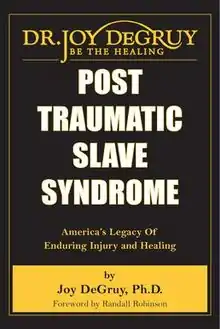Post Traumatic Slave Syndrome
Post Traumatic Slave Syndrome: America's Legacy of Enduring Injury and Healing (PTSS) is a 2005 theoretical work by Dr. Joy DeGruy (née Leary).[1][2] The book describes the multi-generational trauma experienced by African Americans that leads to undiagnosed and untreated posttraumatic stress disorder (PTSD) in enslaved Africans and their descendants.[1] The book was first published by Uptone Press in 2005, with later re-release by the author in 2017.
 | |
| Author | Dr. Joy DeGruy |
|---|---|
| Country | United States |
| Subject | Discrimination & Racism |
| Genre | Sociology / Race Relations |
| Published | 2005 |
| Publisher | Uptone Press |
| Pages | 235 pages |
| ISBN | 0963401122 |
| Website | https://www.joydegruy.com/ |
DeGruy states that Post Traumatic Slave Syndrome is not a disorder that can simply be treated and remedied clinically but rather requires profound social change in individuals, as well as in institutions, that continue to reify inequality and injustice toward the descendants of enslaved Africans. DeGruy spent 12 years developing the quantitative and qualitative research for this book. The theory has been generative of subsequent academic work in clinical psychology and black studies.[3][4]
In addition to forming the basis of public lectures and workshops offered by DeGruy and her contemporaries, the research described in Post Traumatic Slave Syndrome inspired an eponymous play, which was staged at the Henry Street Settlement Experimental Theater, New York, in 2001.[5]
See also
References
- Joy DeGruy.
- Hammond, Pamela V.; Davis, Bertha L. (2007). "Post Traumatic Slave Syndrome". ABNF Journal. 18 (4): 112.
- Hicks, Shari Renée (2015). "A critical analysis of post traumatic slave syndrome: A multigenerational legacy of slavery". search.proquest.com. Approved by Robert F. Morgan and Esther Nzewi (Committee Chair). ProQuest LLC. Retrieved 2021-01-31 – via California Institute of Integral Studies.
- Halloran, Michael J. (2019-01-01). "African American Health and Posttraumatic Slave Syndrome: A Terror Management Theory Account". Journal of Black Studies. 50 (1): 45–65. doi:10.1177/0021934718803737. ISSN 0021-9347.
- Gates, Anita (2001-09-14). "THEATER REVIEW; Foraging in the Mind, Where Slavery's Scars Linger (Published 2001)". The New York Times. ISSN 0362-4331. Retrieved 2021-01-31.
- Post Traumatic Slave Syndrome: America's Legacy of Enduring Injury and Healing, Joy Degruy Leary. Uptone Press (2005). ISBN 978-0963401120
